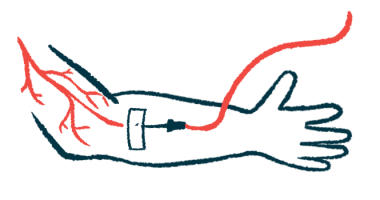Poseida, Takeda Aim to Develop Non-viral Gene Therapies for Hemophilia

Poseida Therapeutics and Takeda are working together to develop non-viral gene therapies for hemophilia and other genetic diseases.
“Together with Takeda, we look forward to developing potential cures for a number of genetic diseases with high unmet need,” Eric Ostertag, MD, PhD, Poseida’s CEO, said in a press release.
Hemophilia is one of many diseases caused by genetic mutations — errors in the code that provides cells with instructions to perform their various functions. Gene therapies aim to “correct” these disease-causing mutations, giving them a curative potential. They can involve delivering a healthy version of a mutated gene to cells, or using gene-editing tools to directly “fix” a mutation in a cell’s DNA.
Regardless of the approach, these therapies all share a common obstacle: in order to change a cell’s DNA, modified genetic material must first reach the inside of a cell.
For many gene therapies, including some approved for use, this obstacle was overcome by using specially engineered viruses. Viruses have evolved to get very good at inserting genetic material into cells, as that is the mechanism by which they infect them.
But virus-based gene therapies have some notable drawbacks. One is that most viruses are only able to effectively deliver genetic material to certain types of cells. Another is that using a virus increases the risks of the immune system mistaking the therapy for an infectious threat, which may lead to side effects or lower the therapy’s efficacy.
The goal of this pharma collaboration is to create gene therapies that are effective, but do not rely on viruses. Researchers will leverage several of Poseida’s platforms, including the piggyBac gene delivery system and a gene-editing system called Cas-CLOVER, as well as nanoparticles and other emerging technologies.
“Our technologies offer highly efficient gene delivery, fully integrated non-viral genome insertion and ultra-precise site-specific gene editing,” Ostertag said.
“Poseida’s differentiated platform technologies show great promise in developing non-viral in vivo [in a living body] gene therapies using their novel genetic engineering and delivery technologies that complement our existing collaborations,” added Madhu Natarajan, rare diseases drug discovery unit head at Takeda.
Work will initially focus on developing six gene therapies, including some aiming to treat hemophilia A. Takeda has the option to add an additional two gene therapies.
Under the terms of the agreement, Poseida will receive an upfront payment of $45 million, with the possibility of additional payments — including up to $2.7 billion for all six gene therapies, and up to $3.6 billion if Takeda chooses to add two more — if additional milestones are met.
Poseida will lead the therapies’ development in preclinical stages, while Takeda will be responsible for clinical testing and commercialization.
“This partnership reinforces Takeda’s commitment to investing in next-generation gene therapy approaches that have the potential to deliver functional cures to patients with rare genetic and hematologic diseases,” Natarajan said.







